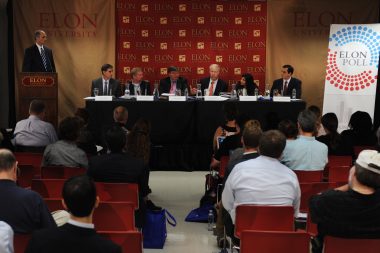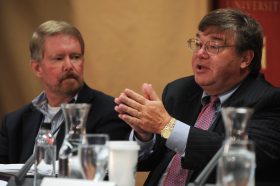A panel of political analysts and journalists said the North Carolina electorate's dynamics indicate it will lean toward Mitt Romney in November.

*****
A panel of journalists and analysts who cover national and North Carolina politics on Sept. 3 debated and dissected data from a special Elon University Poll of likely voters in the Tar Heel State as the Democratic National Convention gets under way in Charlotte, N.C.
>> Watch the full video of the panel discussion
The panel, which took place in an auditorium at The Charlotte Observer, included Taylor Batten of The Charlotte Observer; Rob Christensen of The (Raleigh, N.C.) News & Observer; Charlie Cook of The Cook Political Report and the National Journal; David Gergen of CNN and the Harvard Kennedy School; Anita Kumar, McClatchy Newspapers White House correspondent; and Domenico Montanaro, NBC News deputy political editor. Former Greensboro, N.C. News & Record Editor John Robinson served as moderator.

The Aug. 25-30, 2012, survey of likely voters in North Carolina showed that the Republican presidential candidate holds a slight lead over President Barack Obama, 47 percent to 43 percent.
“What you see here in North Carolina is a transitional state. It was a Southern state, but it’s in the process of becoming a Mid-Atlantic state with a very different voting pattern,” Cook said, attributing much of the change to an influx of new residents from other states, particularly among white voters. “White voters native here aren’t changing much, but the new people coming in are making the difference. That’s what this survey has captured.”
Because the Elon Poll showed that North Carolina’s black voters are firmly in Obama’s corner (89 percent-1 percent), Batten said the president’s ability to repeat his success from 2008 among white voters is crucial to winning the state. He noted that in 2004, John Kerry’s loss of the North Carolina white vote (73 percent-27 percent) helped seal his fate in the state.
“(Obama) would have to get 35 percent of the white vote in North Carolina to have a chance. He was right on that number in 2008,” Batten said. The 32 percent of white voters stating their intention to vote for Obama, according to the Elon Poll, “is the number I’d pay attention to. Will it end up closer to 35 percent? Or will it be closer to Kerry?”
Kumar said Obama would have difficulty achieving that magic 35 percent because, as the poll indicates, North Carolina isn’t happy with the status quo.
“People here are looking for change. The Democratic governor isn’t even running for reelection,” she said. “The poll shows that they believe Gov. Romney can do better with the economy – their No. 1 issue – and that indicates why (Romney’s lead) is 4 (points). It’s starting to show this state is leaning Republican.”
Gergen agrees that on the major issues, the numbers – unemployment, excitement level among young people and support among women and whites – are working against Obama in North Carolina.
“It’s a tough environment for him to deal with. That’s not to say he can’t win the state, but it makes this convention (in Charlotte) even more important, for him to pull North Carolina into his column,” Gergen said. “The president has his work cut out for him.”
Another headwind the president faces, Montanaro said, is the fact that there are so few undecideds in this election – in North Carolina and nationwide.
“(People) know who they want to vote for, and they don’t want to hear anything else,” Montanaro said, citing a recent Pew survey of voter attitudes. “It’s like we have two huge stones, and they’re fighting over the rubble.”
Christensen warned to be careful of judging the electorate’s mood by one or two polls. However, he added, it’s telling that after nearly $50 million has been poured by both campaigns into advertising in North Carolina over the past few months, voters appear to be in the same place they were in early June.
“I think once we’ve seen two or three polls in the next few weeks, we might see if there’s movement in this race,” he said. “But they’re fighting over a very slim margin of voters. Most have made up their minds.”
Looking toward the president’s keynote speech at the convention on Thursday, Cook said Obama needs to help Americans answer the questions: “Are you better off than you were four years ago?” and “Why do you think the next four years will be better than the last four years?”
“He has to lay out a plausible scenario for how things will be better, given the realities of the next four years,” Cook said.


